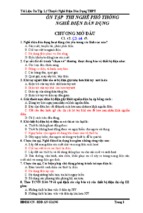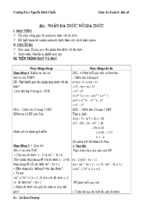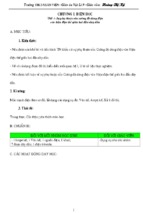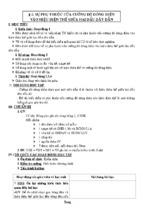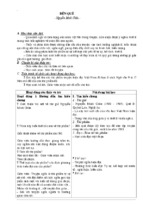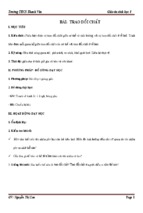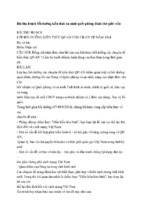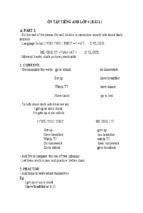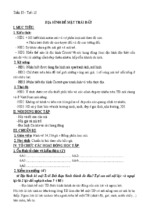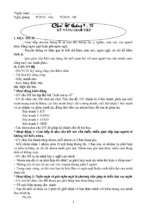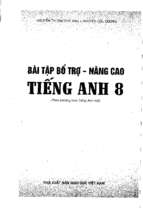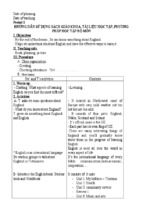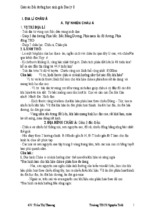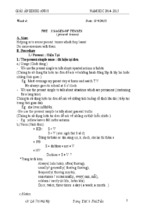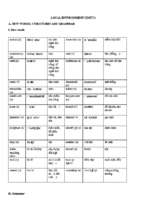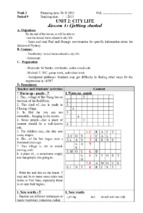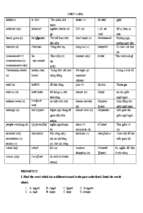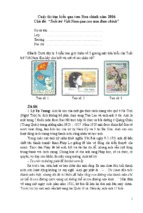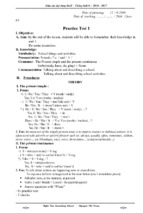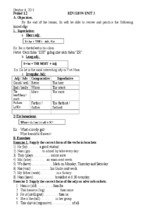Giáo án ôn tập hè Anh 8
Năm học: 2014-2015
Planning date: 19/7/2015
Period: 1,2,3
REVISION ABOUT TENSES & PASSIVE VOICE
I. Aims:
- To help students review and consolidate the knowledge they have learnt in
English 8: Tenses and passive voice
- To develop students’ skills.
II. Objectives: - By the end of the lesson, students will be able to know the
main grammar they need to review and do some exercises to consolidate their
knowledge.
III. Ways of working: T-WC, individual work, pair work.
IV. Materials: Reference books.
V. Anticipated problems:
- Students in class 8C may have difficulty in doing exercises.
VI. Teaching steps:
1. Warm up: (1 min) * Teacher greets and checks the students’ attendance.
2. New lesson: Revision
A.Grammar:
I/ TENSES
1. Simle past (thì quá khứ đơn)
a, đối với “to be”: was (I, She, He, It, N)
Were (you, we, they, Ns)
* Form:
(+) : S + was / were + C
(-) : S + was not / were not + C
(?) : Was / Were + S + C?
b, đối với động từ thường (ordinary verb): chia theo qui tắc và bất quy tắc
- Ved (Ex: looked, liked, invented …)
- V2 (Ex: see – saw, buy – bought, write – wrote, …)
* Form:
(+) S + Ved / V2 + O
(-) S + didn’t + V1 + O
(?) Did + S + V1 + O?
*Use: diễn tả hành động đã xảy ra trong quá khứ và bây giờ đã kết thúc.
*Dấu hiệu nhận biết là các trạng từ chỉ thời gian sau: yesterday, last night, last
+ thứ (last Sunday), last year, last month, last week, ago, when I was
young/small/a child ….
2. Past progressive tense (Thì quá khứ tiếp diễn )
*Form : (+) : S + was / were + Ving + O
(-) : S + was not / were not + Ving + O
(?) : Was / Were + S + Ving +O?
* Use:
- Diễn tả hành động đang xảy ra tại một điểm thời gian xác định trong quá khứ.
*Dấu hiệu nhận biết: trong câu thường có cụm từ :
1
Gv: Đỗ Thị Cúc
Mai
Trường THCS Thanh
Giáo án ôn tập hè Anh 8
Năm học: 2014-2015
- at + số + o’clock + thời gian trong quá khứ (at 4 o’clock yesterday)
S + Was / Were + Ving + at + số + o’clock + thời gian trong quá khứ.
Ex : I was watching TV at at 4 o’clock yesterday.
- Diễn tả một hành động đang xảy ra thì bị làm gián đoạn bởi một hành động
khác. Hành động đang xảy ra dùng ở thì quá khứ tiếp diễn và hành động làm
gián đoạn dùng ở thì quá khứ đơn.
*Dấu hiệu nhận biết: Thường dùng với hai liên từ: While, when.
Form : When + S + Ved / V2 + O, S + was / were + Ving
While + S + was / were + Ving, S + Ved / V2 + O
3.Present progressive tense (thì hiện tại tiếp diễn)
*Form:
S + am / is / are + V- ing + ….
Ex: I am teaching English.
She is playing computer games.
*Use: Diễn tả một sự việc đang xảy ra ở hiện tại hoặc đang xảy ra vào lúc đang
nói ở hiện tại.
+ Dấu hiệu nhận biết: Trong câu thường có các trạng từ chỉ thời gian như now
(bây giờ), at present, at the moment (hiện giờ, vào lúc này), thường nằm ở cuối
câu. Các động từ nhằm tập trung sự chú ý như: Listen!, look!......đứng đầu câu
và có chấm than(!)
4.Present progressive tense with “always ” (thì hiện tại tiếp diễn với
“always”)
*Form : am/ is / are + always + Ving
*Use : tỏ sự than phiền hay phàn nàn về một vấn đề nào đó.
Ex : Nam is always watching TV.
5. Present perfect tense: (Thì hiện tại hoàn thành )
*Form : have / has + Pp(Ved/V3).
Chú ý :
Have (you, they, we, I, Ns)
Has (She, He, It, N)
*Use:
a. Diễn tả hành động xảy ra trong quá khứ kéo dài đến hiện tại có thể đến tương
lai với “ For” và “since”.
Form:
S + have / has + Pp … + for + khoảng thời gian ( for 5 weeks )
S + have / has + Pp … + since + mốc thời gian ( since 1990 )
Ex: I have learned English for 3 years.
He has learned English since 2004.
b. Diễn tả hành động đã xảy ra rồi nhưng không rõ thời gian với trạng từ
“already ”
Form: S + have / has + already + Pp …..
Ex: I have already done my homework.
c. Diễn tả hành động chưa xảy ra hoặc chưa hoàn tất với “not … yet”
Form: S + have / has + not + Pp ……. yet ( have not = haven’t , has not =
hasn’t )
2
Gv: Đỗ Thị Cúc
Mai
Trường THCS Thanh
Giáo án ôn tập hè Anh 8
Năm học: 2014-2015
Ex: I have not done my homework yet .
d. Dùng trong câu nghi vấn với “yet” đứng ở cuối câu
Form: Have / Has + S + Pp + ….. yet ?
e. Diễn tả hành động vừa mới xảy ra với “just”
Form: S + have / has + just + Pp + O
Ex: I have just finished my homework .
II. PASSIVE VOICE (dạng bị động)
+ Cách sử dụng: câu bị động được sử dụng khi chủ từ chịu tác động bởi hành
động của động từ (it is used when the Subject is affected by the action of the
verb.)
+ Cách chuyển đổi từ câu chủ động sang câu bị động (How to change an active
Sentence to a passive Sentence)
- Bước 1: Xác định 3 thành phần chính của câu chủ động là chủ ngữ (S), động từ
(V) và bổ ngữ (O).
- Bước 2: Đổi vị trí của S, V theo sơ đồ sau:
Active:
S
+
V +
O
Passive:
Eg: I
S
+ be + Pp+
write
a letter
O
a letter
is written
by me
- Bước 3: Chia động từ trong câu bị động theo công thức be + PP và lưu ý thời
của Be chớnh là thời của động từ trong câu chủ động. Cụ thể như sau:
a. Thì hiện tại đơn (Passive Form in the present Simple.)
S + is / are / am + past participle + by + O
Ex: She buys a new hat yesterday.
A new hat is bought by her yesterday
b. Thì quá khứ đơn (simple Past )
S + was / were + Pp + by + O.
Ex: She bought a new hat.
A new hat was bought by her
c. Thì hiện tại hoàn thành (present perfecr tense )
S + have / has +been + Pp + by + O
Ex: She has just bought a new hat
A new hat has been just bought by her
d. Động từ khiếm khuyết (Modal verb: will, shall, can, could, may, might,
could, should, have to/ has to, ought to … )
A : S + Mv + V( inf ) + O
P : S + Mv + be + Pp + by +O .
Ex : She will buy a new hat.
A new hat will be bought by her.
e. Thì hiện tại tiếp diễn (present progressive tense)
3
Gv: Đỗ Thị Cúc
Mai
Trường THCS Thanh
Giáo án ôn tập hè Anh 8
Năm học: 2014-2015
A : S + am / is /are + Ving + O
P : S + am /is / are + being + Pp + by + O
Ex : She is writing a letter.
A letter is being written by her.
f. Thì quá khứ tiếp diễn (past progressive tense )
A : S + was / were + Ving + O
P : S + was / were + being + Pp + by + O
Ex : She was writing a letter at 8 o’clock last night.
A letter was being written by her at 8 o’clock last night.
- Bước 4: Chuyển đại từ nhân xưng làm chủ ngữ và bổ ngữ như sau:
S
O
I
me
You
you
We
us
She
her
He
him
They
them
It
it
Chú ý: + Pp ___ Ved
V3
+ by people, by them, by someone ….. được bỏ đi.
B. Exercises:
I. Put the verbs in the brackets into the correct tense.
1. She (come) …………………………..………. to France 2 years ago.
2. I (just send) …………………………………………. the letter.
3. He (work)……………………………………. for that company for 5 years.
4. I (graduate)……………………..………. from Hue University last year.
5. Tom (play )……………………….………. football every afternoon.
6. I (cook) ……………………………..…. in the kitchen when he came in
7. Mai (attend) …………………..…………. a meeting at the moment.
8. (help) ………………………..…. him whenever he needs.
9. Mary (find) ………….… a five – pound note while she (walk) …………………to
school yesterday.
10. I (just finish) ………………… reading War and Peace .It’s a brilliant book.
11. I (not be) …………………… at work tomorrow ,I’m taking the day off.
12. How long …………… you (be ) …….. a nurse, Mss Lan? For 5 years.
4
Gv: Đỗ Thị Cúc
Mai
Trường THCS Thanh
Giáo án ôn tập hè Anh 8
Năm học: 2014-2015
13. While Peter (drive) ………….…….… home late last night he (run)
……………….… out off the petrol.
14. She always (get) ……………………… up early to study her lessons.
15. Nylon (invent) ………….. in early 1930s by an American chemist, Julian
Hill.
II. Change the following sentences into passive voice.
1. Mr Tuan delivered the speech yesterday.
2. Turn off the computer at night.
3. I clean the floor everyday.
4. My mother bought this dress this morning.
5.She did this exercise two days ago.
6.They send him abroad to study chemistry.
7.Nobody has used this room for a long time .
8.Someone has stolen my bike.
9.He has just received a letter from his parents.
10. She will buy this house.
11. They are building my house.
12. Lan was making my new dress at this time yesterday.
13. The milkman brings bottles of milk to houses.
14. How do people learn languages?
15. John will collect me at the ariport.
16. The manager must sign the cheque.
17. They kept me waiting for half an hour.
18. We can't wear jeans at work.
19. Will you invite her to your birthday party?
20. Do they speak French and English in Canada?
III. Put the words or phrases in correct order to make sentences:
1. enough/ Jane/ stay/ to/ alone/ old/ isn't/ at home.
2. you/ going/ to/are/ what/ do/ next weekend?
3. she/ hair/ black/ has/ long/ straight.
4. in the east/ rises/ sun/ the/ in the west/ sets/ and.
5. table/ large/ was/ in the kitchen/ there/ a/ wooden/ round.
6. awful/ an/what/ house!
7. have/ money/ buy/ that/ we/ enough/ to/ didn't/ car.
8. free/ he/ most/ time/ sports/ spends/ of/ his/ playing.
IV.Choose the word that has underlined part pronounced differently from
the others.
1. a. planet
b. character
c. happy
d. classmate
2. a.letter
b. twelve
c. person
d. sentence
3. a. humor
b. music
c. cucumber
d. sun
4. a. enough
b. young
c. country
d. mountain
5. a. sociable
b. ocean
c. receive
d. special
6. a. dark
b. father
c. star
d. principal
5
Gv: Đỗ Thị Cúc
Mai
Trường THCS Thanh
Giáo án ôn tập hè Anh 8
7. a. old
8. a. my
9. fair
10. a. spends
b. sociable
b. curly
b. straight
b. laughs
Năm học: 2014-2015
c. outgoing
c. library
c. train
c. friends
d. volunteer
d. lucky
d. wait
d. potatoes
- The end-
Planning date: 22/7/2015
Period: 4,5,6
REVISION ABOUT REPORTED SPEECH
I. Aims:
- To help students review and consolidate the knowledge they have learnt in
English 8: Reported speech
- To develop students’ skills.
II. Objectives: - By the end of the lesson, students will be able to know the
main grammar they need to review and do some exercises to consolidate their
knowledge.
III. Ways of working: T-WC, individual work, pair work
IV. Materials: Reference books.
V. Anticipated problems:
- Students in class 8C may have difficulty in doing exercises.
VI. Teaching steps:
1. Warm up: (1 min) * Teacher greets and checks the students’ attendance.
2. New lesson: Revision
A.Grammar:REPORTED SPEECH (câu gián tiếp)
I. Quy tắc chung
1. Direct speech(lời nói trực tiếp): là lời nói của một người nào đó được
thuật lại nguyên văn.
Ex : Mary said to me “our teacher will give us a test”
2. Indirect speech (lời nói gián tiếp): là lời của một người nào đó thuật lại
với từ và cách nói của người thuật lại nhưng ý nghĩa không thay đổi.
Ex : Mary said to me our teacher would give us a test.
3. Lời nói trực tiếp hay lời nói gián tiếp gồm có hai phần.
+ mệnh đề tường thuật (mệnh đề chính)
+ Lời nói trực tiếp hay lời nói gián tiếp.
6
Gv: Đỗ Thị Cúc
Mai
Trường THCS Thanh
Giáo án ôn tập hè Anh 8
Năm học: 2014-2015
Ex : Henry said :
“I’m studying law next year”.
mệnh đề tường thuật
Lời nói trực tiếp
Ex : Henry said (that)
he was studying law the next year ”.
mệnh đề tường thuật
lời nói gián tiếp
4. Một số thay đổi khi đổi từ câu trực tiếp sang câu gián tiếp
a. Đại từ làm chủ ngữ
I
He / She
We
they
You
they, he, she
b. Đại từ làm tân ngữ
me
him / her
us
their
you
them, her, him
c. Đại từ sở hữu
my
his / her
our
their
you
their, her, him
* Động từ tường thuật có tân ngữ: chủ từ của câu trực tiếp được đổi theo tân ngữ
của động từ tường thuật.
Ex : He said to me “You do the test very well.”
He told to me (that) I did the test very well.
Tom said to Mary: “It’s very kind of you.”
Tom told Mary (that) It was very kind of her.
* Chủ từ của câu trực tiếp là ngôi thứ ba số ít: She, He, It, They …. thì khi đổi
sang câu gián tiếp ta không thay đổi.
Ex : He said: “She’s a nice person.”
He said that she was a nice person.
d. Thay đổi thì : Khi động từ tường thuật ở thì quá khứ đơn, thông thường
động từ của câu trực tiếp đổi sang câu gián tiếp phải lui về quá khứ một
thì tương ứng.
Direct speech
Indirect speech
Simple present
Simple Past
(am / is / are)
(was / were)
(V/ Vs / es )
(Ved / V2)
Present progressive
Past progressive
(am/ is / are + Ving)
(was / were + Ving)
Will
would
Can
could
Shall
should
Have to
had
Must
had
May
might
Ought to
ought to
Could
could
Should
should
7
Gv: Đỗ Thị Cúc
Mai
Trường THCS Thanh
Giáo án ôn tập hè Anh 8
Năm học: 2014-2015
* Khi động từ tường thuật ở thì hiện tại đơn hay thì tương lai đơn, thì hiện tại
hoàn thành thì câu trực tiếp đổi sang câu gián tiếp chúng ta không thay đổi thì
(giữ nguyên thì của động từ trong câu trực tiếp).
e. Một số thay đổi khác.
Direct speech
Indirect speech
Now
then
Ago
before
Today
that day
Yesterday
the day before,
Tomorrow
the next day, the following day
Last night
the night before
week
the week before
month …
the month before
here
there
this
that
these
those
* Note: This / these + từ chỉ thời gian
that / those + từ chỉ thời gian
Ex: this morning
that morning
This / these + danh từ ( noun )
the + danh từ ( noun )
Ex: this book
that book
II. Các dạng câu tường thuật
1.Câu mệnh lệnh và câu yêu cầu .
Câu gián tiếp
“Will you + bare inf + O…..,please ?” S + asked + O + to inf + O / A
“Can you + bare inf + O
, please ?”
told
“Please + bare inf + O
.”
ordered
“Would you like + to inf + O ”
Ex :”Will you hand me a book ?”
She asked me to hand her a book .
Ex : “Clean the bike ” He said to Nam
He asked Nam to clean the bike
2.Mệnh lệnh phủ định ( negative commands )
Don’t + bare inf + O / A ,please
S + asked + O + not to inf + O / A
told
ordered
Ex : “Don’t talk in class. ” teacher said to the children.
Teacher asked the children not to talk in class.
3. Yes / No – question
Khi đổi câu hỏi Yes / No – question sang câu gián tiếp ta thực hiện một số bước
sau:
a. Dùng động từ ask ở mệnh đề chính (hay mệnh đề tường thuật )
8
Gv: Đỗ Thị Cúc
Mai
Trường THCS Thanh
Giáo án ôn tập hè Anh 8
Năm học: 2014-2015
b. Thêm If hay Whether sau mệnh đề tường thuật, đưa câu hỏi về dạng
câu khẳng định (đối với động từ thường ta bỏ trợ động từ Do / Does )
c. Thực hiện một số thay đổi theo quy tắc chung (phần A).
d. Bỏ dấu hỏi ở cuối câu.
* Yes / No – question với động từ “to be”
“ is /am/are + S + C ? ”
S + asked + (O) + If / Whether + S + was / were + C
Ex : “Are you late? ” he said to me.
He asked me If I was late.
* Yes / No – question với Modal verb (can, will, could ….)
“ M.v + S + Vinf + O ?”
S + asked + O + If / Whether + S + Mv + Vinf + O
Ex : “ Can you sing a song? ” he said to me.
He asked me If / whether I could sing a song.
* Yes / No – question với động từ thường ( ordinary verb )
“Do / does + S + Vinf + O ? ”
S + asked + O + If / whether + S + Ved / V2 + O
Ex : “Does she buy a new book? ” Lan said to me
Lan asked me If / Whether she bought a new book .
4. Wh- question. Khi đổi câu hỏi Wh – question sang câu gián tiếp ta
thực hiện một số bước sau:
a. Giữ lại từ để hỏi sau mệnh đề tường thuật, đưa phần còn lại của câu hỏi
về dạng câu khẳng định (đối với động từ thường ta bỏ trợ động từ Do/ Does).
Hoặc với động từ thường ta có thể bỏ chủ từ, trợ từ đưa động từ chính về dạng
động từ nguyên mẫu có “to” để nối tiếp vào với từ để hỏi
c. Thực hiện một số thay đổi theo quy tắc chung.
d. Bỏ dấu hỏi ở cuối câu.
“ Wh + be + S + C ? ”
“ Wh + do /does / Mv + S + Vinf + O ? ”
S + V +(O ) +
Wh + S + be + C
Wh + S + (Mv ) + V + O
Wh + to inf + O
Ex : “Where is your bike?” he said to me.
He asked me where my bike was.
“ What do you buy ?”he said to me.
He asked me what I
bought.
to buy.
Ex “Where is your bike?” he say to me.
He asks me where my bike is.
“ What do you buy ?”he say to me.
He asks me what I buy
to buy
9
Gv: Đỗ Thị Cúc
Mai
Trường THCS Thanh
Giáo án ôn tập hè Anh 8
Năm học: 2014-2015
B. Exercises:
I- REPORTED STATEMENTS:
1. “ I’ll see you tomorrow’’ She said......
2. “ I saw her today’’ She said......
3. “I don’t like this film’’ � She said......
4. “ We went swimming today’’ � She said......
5. “ I’ll meet Mary on Sunday’’ � She said.......
6. “ Peter and Sue are getting married tomorrow’’ � He said.....
7. “I really like this furniture’’ � She said......
8. “ I’m meeting them at four o’clock today’’ � He said....
9. “ I live here with my parents’’ � He said.....
10. “ Our new house is beautiful’’ � He said....
11. “ I want to be a teacher of English’’ � He said....
12. “ I can’t speak chinese’’ � She said......
13. “ My sister is now having a wonderful time in Nha Trang’’ � He said....
14. “ I’ll be very busy today’’ � She said......
15. “ I must come to the meeting tomorrow’’ � He said....
16.“ These roses are for you’’ � She told me......
17. “ I’m going away tomorrow , mother’’ � He said....
18. “ Nothing can grow in my garden. It never gets sun � He said....
19. “ It is so foggy today’’ � She said......
20. “ If you answer the questions correctly, you may win us 100 � She said......
II- Reported yes – no questions.
1. “Do you want to buy any second – hand books?’’ � Bill asked me……….
2. “Do you play any musical instruments?’’=> Lan asked me…………..
3. “Will you have time to play regularly? ’’=> Bill asked me………….
4. “Do you play for your school team?’’ => Lan asked me…………..
5. “Can you speak any other languages?’’ � He asked me......
6. “Are you interested in learning English?’’ => Lan asked me…………..
7. “Is there a phone?’’ => Lan asked me…………..
8. “Do you have many friends?’’ � He asked me......
9. “Do you often get home after 10 .30 p.m?’’ => Lan asked me…………..
10.“Can you speak English?’’ => Lan asked me…………..
11.“Are you working as well as studying?’’ � He asked me......
12.“Are you interested in acting?’’ => Lan asked me…………..
13.“Is there a college orchestra?’’ � He asked me......
14.“Have you seen my car keys?’’ => Lan asked me…………..
15.“Will you come here next week?’’ � He asked me......
16.“Are you hungry?’’ => Lan asked me…………..
17.“Does your brother live in London?’’ => Lan asked me…………..
18.“Do you know who broke the window?’’ � He asked me......
19.“Have you heard yourself?’’ => Lan asked me…………..
20.“Have you finished your exam?’’ � He asked me......
10
Gv: Đỗ Thị Cúc
Mai
Trường THCS Thanh
Giáo án ôn tập hè Anh 8
Năm học: 2014-2015
III- Wh-questions:
1. “Why do you have to do this work?’’ � He asked me......
2. “What are you doing?” => He asked Lan……
3. “What will you do when you leave school?” => Lan asked me…………..
4. “How did you know my name?” => He asked Lan…….
5. “Why didn’t you phone me?” => He asked Lan…….
6. “When can I see the doctor?” => Lan asked me…………..
7. “Where are you going?” => He asked Lan…….
8. “Where are you going to spend the holiday?” => Lan asked me…………..
9. “How big are the classes?” => He asked Lan…….
10.“What sorts of food do they serve?” => Lan asked me…………..
11. “How long are you staying here?” => Lan asked me…………..
12. “What are you going to study ?” => He asked Lan…….
13. “What kind of sports do you like best?” => He asked Lan…….
14. “What do you think of the canteen coffee?” => Lan asked me…………..
15. “What’s the name of the college?” => He asked Lan…….
16. “How many students are there in the college?” => He asked Lan…….
17. “Who is the headmaster?” => Lan asked me…………..
18. “What country do you come from?” => He asked Lan…….
19. “How long do you stay here?” => Lan asked me…………..
20. “How will you use English in the future?” => He asked Lan…….
21. “How far is it to the school?” => Lan asked me…………..
22. “How do you go to school?” => He asked Lan…….
23. “Why are you so late?” => He asked Lan…….
24. “How did you get to school?” => Lan asked me…………..
25. “Why won’t they let me in?” => He asked Lan…….
26. “Who do you want to talk to?” => He asked Lan…….
- The end-
Planning date: 26/7/2015
Period: 7,8,9
REVISION ABOUT OTHER STRUCTURES
I. Aims:
- To help students review and consolidate the knowledge they have learnt in
English 8: Other structures.
- To develop students’ skills.
II. Objectives: - By the end of the lesson, students will be able to know the
main grammar they need to review and do some exercises to consolidate their
knowledge.
III. Ways of working: T-WC, individual work, pair work
11
Gv: Đỗ Thị Cúc
Mai
Trường THCS Thanh
Giáo án ôn tập hè Anh 8
Năm học: 2014-2015
IV. Materials: Reference books.
V. Anticipated problems:
- Students in class 8C may have difficulty in doing exercises.
VI. Teaching steps:
1. Warm up: (1 min) * Teacher greets and checks the students’ attendance.
2. New lesson: Revision
A.Grammar: Một số mẫu cấu trúc cần nhớ khác.
1. Mẫu câu với động từ.
S + V + to inf + O
Ex : She want to buy a new pen
S + Modal V + Bare inf + O Ex : She can sing a song
S + V + Ving + O
Ex : She enjoys watching TV
(Sau các động từ sau là động từ thêm ing: enjoy, love, like, hate, mind, suggest,
… và sau các giới từ )
2. Câu yêu cầu với “Mind”
Would you mind + Ving + O?
(yêu cầu người khác làm)
Do you mind
Would you mid If I + Ved / V2 + O? (đề nghị mình làm)
Do you mind If I + V1 / Vs/es
3. In order to / so as to + V ( bare inf ) : diễn tả mục đích
Ex: He does morning exercises in order to keep fit.
4. Mẫu câu với tính từ
a. S + be + adj + to inf ……
Ex : I’m glad to see you again
Một số tính từ chỉ cảm giác (happy, glad, sad, bored, surprised … ) và các
tính từ : sure, certain, right, careful, lucky, wrong….. được theo sau bởi
một động từ nguyên mẫu có “to”.
b. S + be + (that ) + Clause (S + V …)
Ex: I’m glad that you can make it.
5.- ED and ING Participle (quá khứ phân từ và hiện tại phân từ) được sử dụng
như tính từ dùng để rút gọn mệnh đề tính từ.
Ex : The boy is in my class. He is reading a book. (Ving)
The boy reading a book is in my class.
Ex There are many books. They are written in English.( Pp )
There are many books written in English.
Ex : The old lamp is five dollars. It was made in China.
The old lamp made in China is five dollars.
6. Compound adjective. (tính từ kép) Language focus 3 _ P 130
Use: to form a compound Adj
Form: noun + Verb – ing
Ex : fire – making.
Ex : It is a contest in which participants have to make fire.
It’s a fire making contest.
5.Cấu trúc câu với enough
- Với tính từ/trạng từ: S + be + Adj/Adv + enough + to + V.
- Với danh từ: S + động từ + enough +noun + to + V.
12
Gv: Đỗ Thị Cúc
Mai
Trường THCS Thanh
Giáo án ôn tập hè Anh 8
Năm học: 2014-2015
6.Cấu trúc câu so sánh
a.Comparative: ( So sánh hơn )
*So sánh hơn của tính từ ngắn:
S1 + to be + adjective – er + than + S2
Ex: This book is older than that one.
*So sánh hơn của tính từ dài:
S1 + to be + more + adjective + than + S2
Ex: This book is more interesting than that book.
b.Superlative: ( So sánh nhất )
*So sánh nhất của tính từ ngắn:
S + to be + the +Adjective - est + …..
Ex: Lan is the tallest student in my class.
*So sánh nhất của tính từ dài:
S + to be + the most + Adjective + …..
* Ngoại lệ:
Adjective
Comparative
Superlative
good ( tốt)
better ( tốt hơn)
the best ( tốt nhất)
many/ much ( nhiều)
more ( nhiều hơn)
the most ( nhiều nhất)
little ( ít )
less ( ít hơn )
the least ( ít nhất )
bad
(xấu)
worse (xấu hơn)
the worst ( xấu nhất)
Hãy viết các tính từ sau chuyển sang so sánh hơn và so sánh nhất .
1. tall
taller
the tallest
2. short
………………………………………
3. big
………………………………………
4. small
………………………………………
5. long
………………………………………
6. thick
………………………………………
7. high
………………………………………
8. old
………………………………………
9. good
………………………………………
10. bad
………………………………………
11. hot
………………………………………
B. Exercises
I.Complete the sentences. Use the comparative.
a/ My car isn’t very big. I wants a ……….car.
b/ This house is not very modern. I prefer …………………house.
c/ You are not tall. Your sister ………….. than you.
d.It’s not warm today. It ……………..yesterday.
e. Lao is not very large. Vietnam………………..
f/ People today are not polite. In the past they were………….
g/ Hoa is not work very hard. I work……………………
h/ Last night I went to bed…………….(early) …. usual.
i/ The exam is qiuet difficult. It…………(difficult)…we expected.
13
Gv: Đỗ Thị Cúc
Mai
Trường THCS Thanh
Giáo án ôn tập hè Anh 8
Năm học: 2014-2015
j. Is your headache better? No, It…………..(bad)
*Keys.
a. bigger
b. more modern c. is taller
d. is warmer than
e. is larger
f/ more polite
g. harder
h. earlier than
i. is more difficult
j. is worse.
II.Circle a,b,c or d
1.Cool the burns immediately so as to ……………………tissue damage.
a. ease
b. relieve
c. minimize
d. maximize
2. The lane is ……………………Nguyen Trai Street and Tran Hung Dao Street.
a. near
b. between
c. beside
d. on
3. …………………… you post this letter for me, please ?
a. Will
b. Do
c. Are
d. Won’t
4.She promises she
……………………back in about half an hour.
a . is
b. be
c. has been
d. will be
5. …………………… I do the washing-up? – No, thanks. I can do it myself.
a . Can
b. Would
c. Shall
d. Won’t
6. People use first-aid …………………… ease the victim’s pain and anxiety.
a. so that
b. in order to
c. so as not to
d. in order that
7. …………………… is used to check one’s eyesight.
a. eye-shade
b. eyeglass
c. eyepiece
d. eye chart
8. Milk…………………… to the houses by the milkman every day.
a. brings
b. is bring
c. is brought
d. has brought
9.We were delighted ……………………your letter last week.
a. getting
b. to get
c. get
d. got
10. “Would you like to go to the movies tonight?” “I’m sorry, I can’t. I
....………… my homework this evening.”
a. am doing
b. do
c. will do
d. doing
11. Milk bottes can be …………………… after being cleaned.
a. recycled
b. thrown away c. broken
d. reused
12. This project ......................... next month.
a. is carried out b. will carry out
c. carried out d. will be carried out
13. It’s dangerous ……………………… in this river.
a. swim
b. to swim
c. swimming
d. swam
14. We are looking forward to .............................. you in June.
a. seeing
b. see
c. saw
d. be seen
15. The pyramid of cheops is one of the seven………………… of the world.
a. pyramids
b. temples
c. landmarks
d. wonders
16. I can see a boy ……………………
a water buffalo.
a. ride
b. riding
c. to ride
d. rode
17. It’s…………………………… to travel around Vietnam.
a. interesting
b. interested
c. interestingly
d. interestedly
18. Would you mind……………………the windows.
a. to close
b. closing
c. close
d. closed
14
Gv: Đỗ Thị Cúc
Mai
Trường THCS Thanh
Giáo án ôn tập hè Anh 8
Năm học: 2014-2015
20. ……………………………you mind if I smoke ?
a. Could
b. Don’t
c. Do
d. Would
21. My sister likes sweets…………………………… from chocolate.
a. making
b. made
c. to make
d. make
22. This is the first time Sharnon ……………………… rice paddies.
a. is seeing
b. saw
c. see
d. has seen
24. They are good friends. They……………………each other for a long time.
a. know
b. have known c. knew
d. were knowing
25. How about……………………… to Thai Binh Market?
a. going
b. to go
c. went
d. gone
26. “What ……………………… in New York?”-“It’s very cold and humid.”
a. the weather like
b. does the weather like
c. the weather is like
d. is the weather like
27. “………… to come and have dinner with us?”-“I’d love to but I’m busy.”
a. Do you want
b. Would you like
c. Would you mind
d. Could you please
28. Can you tell me where
……………………… ?
a. she does
b. does she
c. she is
d. is she
29. I was reading………………… my sisters were playing with their dolls.
a. when
b. while
c. at which
d. at time
30. Millions of Christmas cards ……………………… every year.
a. were sent
b. are sent
c. sent
d. is sending
III. Combine these sentences using present participle or past particple.
1. The man is a clown. He is trying to stand on a ball.
2. The envelope has no stamp on it. It lies on the table.
3. The energy is radiated by the sun. It can boil water and run machines.
4. Flowers are grown in Dalat. We exported them to foreign countries.
5. The man works in this hospital. He can speak three foreign languages.
6. "The Old Man and the Sea" was written by Hemingway. It is very interesting.
7. The boy was taken to the hospital. He was injured in the accident.
8. The street is very wide. It leads to the school.
9. Mr John is my friend. He teaches my son English.
10. The students are sitting for the exam. They are from Singapore.
- The end-
Planning date: 31/7/2015
15
Gv: Đỗ Thị Cúc
Mai
Trường THCS Thanh
Giáo án ôn tập hè Anh 8
Năm học: 2014-2015
Period: 10,11,12
REVISION
I. Aims:
- To help students review and consolidate the knowledge they have learnt in
English 8:
- To develop students’ skills.
II. Objectives: - By the end of the lesson, students will be able to know the
main grammar they need to review and do some exercises to consolidate their
knowledge.
III. Ways of working: T-WC, individual work.
IV. Materials: Reference books.
V. Anticipated problems:
- Students in class 8C may have difficulty in doing exercises.
VI. Teaching steps:
1. Warm up: (1 min) * Teacher greets and checks the students’ attendance.
2. New lesson: Ask Ss to do some tests
Test 1:
I. Choose the word whose underlined part is pronounced differently:
1. a. hate
b. statue
c. danger
d. plane
2. a. arrive
b. valley
c. around
d. abroad
3. a. science
b. field
c. believe
d. movie
4. a. way
b. without
c. want
d. wrong
5. a. shop
b. monitor
c. post
d. positive
II. Put one suitable preposition to complete the sentences:
1. He is never absent............................school.
2. She is afraid.....................crossing the busy street.
3. She was excited....................the trip to the countryside .
4. It's kind...................you to help me with the heavy bag.
5. Your shoes are different......................hers.
6. I'll see you.........................Sunday, April 1st.
7. I haven't seen you for ages. I last saw him.....................2010.
8. They often go out for dinner.......................Saturday evenings.
III. Supply the correct form or tense of the verbs in brackets.
1. My father usually (go) ....................to work by bus
2. When I am tired, I enjoy (watch)........................... TV
3. When he arrived, my mother (cook).......................... dinner
4. You (see)........................ the film “Titanic” yet?
5. How long you (be)......................... here?
6. He (not meet ) .............................her for a long time
7. Don’t forget (turn off)..................... the lights before (go) ...................out
8. Would you mind (close)............................ the door?
9. The man (sit)......................... next to me was very nervous
10.She has a lot of novels (write).......................... in English
16
Gv: Đỗ Thị Cúc
Mai
Trường THCS Thanh
Giáo án ôn tập hè Anh 8
Năm học: 2014-2015
IV. Rewrite the following sentences using cues
1/. The glass bottles will be broken into small pieces.
People………………………………………………
2/. ”She is a teacher” . Nga said .
Nga said……………………………………………
3/. Why don’t we go to the beach?
How about…………………………………………. .
4/ To learn English is difficult.
It is……………………………………………………………………….
5/ Someone will translate this letter into Vietnamese.
This letter………………………………………………………………….
6/ Johnny said to me “ I don’t know what Fred is doing”
Johnny said to me…………………………………………………………
7/ Nien asked Hoa “ Do you have many new friends ?”
Nien asked Hoa …………………………………………………………..
8/ This house was built more than 100 years ago.
People…………………………………………………………………..
9/" Do you go to school by bike ?"Na said to me
Na asked...................................................................................................
10/ I don't know how ( do )………. this math exercise.
11/ Susan said " My sister is coming to see me next week. "
Susan..................................................................................................................
12/ People speak English all over the world.
English …………………………………………………………………………
13 .I will repair your bike tomorrow
Your bike………………………………………………………………….
14.The woman is sitting next to me. She is nervous
The woman …………………………………….…………………………….
15.The car is made in Japan . It is $ 4000
The car …………………………………………………..………………………
16/ Could you tell me how to study English ?
Would you mind………………………………………………………………..?
17/ they built this house more than one hundred years ago.
This house……………………………………………………………………..
18/ “Is Phong Nha in Quang Tri province ?”
The tourist asked Lan……………………………………………………………
19. The man is sitting next to me. He is my father’s friend.
=> The man ………………………………………………………………………
20. The old lamp is made in China. It’s 5 dollars.
=> The old lamp …………………………………………………………………
21. I want you to send this letter for me.
17
Gv: Đỗ Thị Cúc
Mai
Trường THCS Thanh
Giáo án ôn tập hè Anh 8
Năm học: 2014-2015
=> Would you mind ……………………………………………………………
22. I give her a present.
=> She……………………………………………………………………………
23.Could you please give me some information about the English course,please?
Would you mind ………………………………………………………………?
24.“ I’m a plumber ” said Nam
Nam said ………………………………………………………………………
25.“ Do you know My Son,Nga ” Hoa said
Hoa asked ………………………………………………………………………
V.Choose the word ( A, B, C or D) that best fits each of the blank spaces
We ....(1).... to Thai land for our summer vacation last year. I was our first ....
(2)....to Asia. We loved it. We went to the floating market very early one
morning. We didn't buy anything there , we just looke. Another day, we went to
Wat phra Keo, the famous Temple of the Emerald Buddha. It was really ....
(3)....Then we saw two more temple nearby. We also went on a river ....(4)....
somewhere outside Bangkok. The best thing ....(5).... the trip was the food. The
next time we have friends over for dinner, I ....(6).... Thai food.
1/ A. go
B. went
C. are going
D. will go
2/ A. vacation
B. holiday
C. trip
D. A&B
3/ A. interested
B. interesting C. bored
D. boring
4/ A. trip
B. walk
C. travel
D. bank
5/ A. in
B. on
C. of
D. about
6/ A. cook
B. cooked
C. am cooking
D. am going to cook
Test 2:
I. Use the correct form of word:
1. We are having a…………….time in Hanoi (wonder)
2. This is an…………………………film (interest)
3. They enjoy …………………….in the sea (swim)
4. The drivers should drive their cars…………….in busy streets (care)
5. This book is the………………of all ( good)
6. The poem ………by Clement Clarke Moore became popular in the USA
(write)
7. Are you …………………….in a harvest festival? (interest)
8. I saw him………………….the flowers in the garden (water)
9. Be…………….. in your work! (care)
10.He is a…………………….inventor (fame)
II. Fill in the blank with ONE suitable preposition:
1. My mother is very keen
……………………… growing roses.
2. John is extremely fond
……………………… music.
3. Are they interested ………………………
a harvest festival?
4. How many members participated………… the rice-cooking contest?
5. Santa Claus is based…………… the description of Saint Nicholas
6. That’s very kind...................you to help me.................this math problem.
18
Gv: Đỗ Thị Cúc
Mai
Trường THCS Thanh
Giáo án ôn tập hè Anh 8
Năm học: 2014-2015
7. Minh works hard ...........................Monday...........................Friday.
8. You can meet me..........................................7.15 and 8.00.
9. I’ll leave.........................7 o’clock, so you should call me............... 7.00.
10. Don’t worry…………….it. I will help you…………my ability
III. Rewrite the following sentences using cues
1.They built that house in 1986.
That house……………………………………….………………………………
2.“Where do you live, Minh?” Nhan said
Nhan asked …………………………………..…………………………………
3. “Is Ha Long Bay in Quang Binh province ?”
I asked my father ………………………………………………..………………
4. Could you tell me how to study english ?
Would you mind ………………………………………………………………?
5. “ Is she a teacher ?” Nga said
Nga said ………………………………………………………………………….
6.“ Do many tourists visit Viet Nam every year , Hanh?’’ Susan asked .
Susan asked Hanh ........................................................................................
7. Shall I sit here ?
Do you mind if I …………………………………………………..…………
8. It is a contest in which participants have to cook rice.
It’s a………………………………………………………….…………………
9. They passed all the exams .They are lucky.
They are lucky......................................................................................................
10. Putting a knife into an electrical socket is dangerous.
It is.......................................................................................................................
11. Mai bought a new shirt yesterday.
A new shirt………………………………………………………………………
12. Huong said: " I'll go to Ha Noi tomorrow".
Huong said that …………………………………………………………………
13. To learn English is very interesting.
It's ………………………………………………………………………………
14. Could you give me the bag?
Would you mind ………………………………………………………………
15. I started learning English 3 years ago.
I have..................................................................................................................
16. Mr Nam repaired the computer.
The computer .......................................................................................................
17. " I enjoy playing soccer" Ba said .
Ba said that ...... ..................................................................................................
18. " Do you know English ?" . Lan asked Nga
Lan asked Nga ....................................................................................................
19. My grandfather grows a lot of flowers.
A lot of flowers ......................................................................................................
19
Gv: Đỗ Thị Cúc
Mai
Trường THCS Thanh
Giáo án ôn tập hè Anh 8
Năm học: 2014-2015
20. The facsimile was invented by Alexander Bain in 1843.
Alexander Bain ......................................................................................................
21. Learning English is very interesting
It’s………………………………………………………………………………
22. Is it all right if I take some photographs?
Would you mind…………………………………………………………………
23. We have built two department stores this year
Two department stores………………………………………………………….
24. “I will go to Hue tomorrow”
He told me……………………………………………………………………
25. I last saw him three days ago
I have……………………………………………………………………………
IV.Read the text carefully then do the exercises
Vietnam's New Year is celebrated according to the Lunar calendar.
It’s officially.(1)................as Tet Nguyen Dan or Tet. It begins.
(2)....................January twenty -first and February nineteen. The exacts day
changes from year to year. Vietnamese people usually make preparations for the
holiday several weeks beforehand. They tidy their houses, cook special food,
clean and make offerings on the family altars. On the New year's Eve, people sit
up to midnight to see the New year in , then they put on new .
(3)....................and give one another the greetings of the season. Tet last ten
days. The first three days are the most (4)........... Vietnamese people believe that
how people act during those days will influence the whole year. As a result, they
make every effort to avoid arguments and smile as much as possible.
*/ choose the correct words to fill in the gaps
1/
a/ knows
b/ knew
c/ know
d/ known
2/
a/ between
b/ in
c/ at
d/ after
3/
a/ friends
b/ clothes
c/ shoes
d/ shirt
4/
a/ happy
b/ nice
c/ important
d/ popular
**/ Answer the questions
5/ What is Vietnam's New Year known as?
……………………………………………………………………………………
6/ What do Vietnamese people usually do to prepare for Tet ?
……………………………………………………………………………………
7/ Which days of Tet do you think the most important ?
……………………………………………………………………………………
8/ Do you like the New year's Eve ? When is it ?
……………………………………………………………………………………
V. Make questions for the underlined parts.
1. Two hundred people are employed by the company.
2. Cheese and butter are made from milk.
3. The result will be known next week.
20
Gv: Đỗ Thị Cúc
Mai
Trường THCS Thanh
- Xem thêm -

